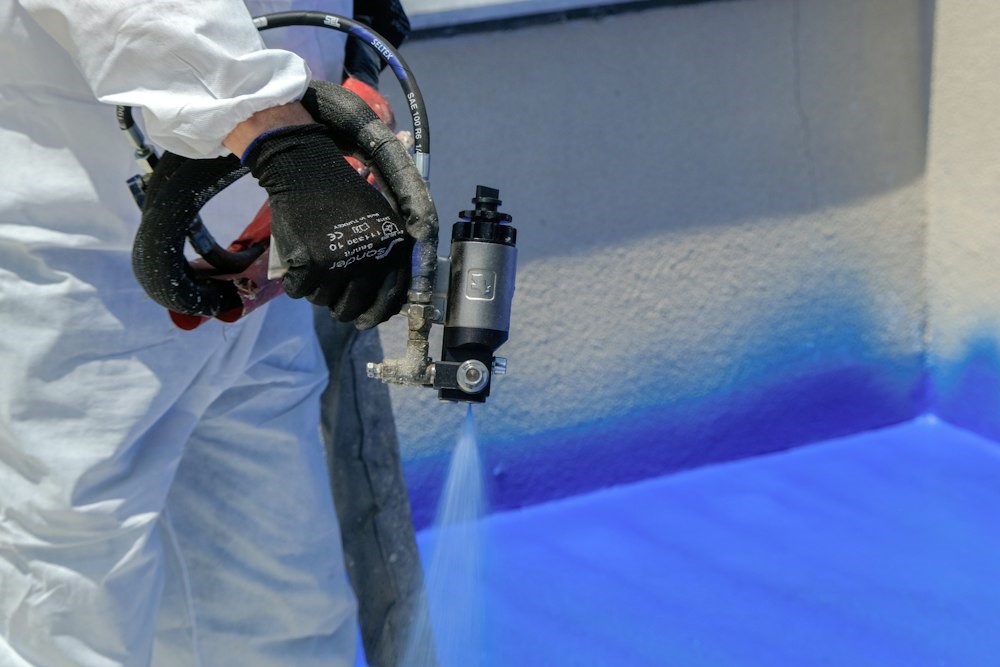Everything You Need to Know About Polyurea Coatings

Polyurea coatings have gained significant popularity in the building and construction industry due to their versatility, durability, and long-lasting protection. Originally developed in the late 1980s, polyurea coatings were primarily used in the automotive industry. However, over the years, their applications have expanded to various industrial, commercial, and residential sectors.
What is Polyurea?
Polyurea coatings are composed of two main components: a base and a hardener. These coatings are formed through a chemical reaction between isocyanate and an amine resin. This reaction occurs rapidly, usually within a few seconds, requiring the use of advanced technology for quick and precise application. Polyurea has a remarkable tensile strength, making it one of the strongest protective materials available. When properly maintained, polyurea coatings can last over 30 years without the need for frequent touch-ups or replacements.
The Benefits of Polyurea Coatings
Polyurea coatings offer numerous advantages that make them an excellent choice for protecting various surfaces. These benefits include:
1. Durability and Flexibility
Polyurea coatings are much stronger than traditional coating materials such as epoxy and polyurethane. They provide unmatched flexibility and can withstand extreme temperature variations. Additionally, polyurea coatings exhibit high impact, chemical, and abrasion resistance, making them ideal for demanding environments.
2. Easy Maintenance
Once fully cured, polyurea coatings create a smooth, solid surface that is easy to clean and maintain. These coatings can withstand sanitization and power washing techniques, making them particularly suitable for use in food manufacturing and healthcare facilities.
3. Longevity
With proper maintenance and regular cleaning, polyurea coatings can last for more than three decades before requiring any repairs or replacements. The consistent, long-lasting results of polyurea coatings make them a cost-effective choice for protecting various structures.
4. Chemical Resistance
Polyurea coatings form a durable and flexible barrier that prevents water damage and protects against harmful chemicals. These coatings are resistant to petroleum-based and caustic chemicals, ensuring the long-term integrity of the protected surface.
5. Waterproofing Capabilities
One of the primary applications of polyurea coatings is waterproofing. Whether it’s concrete flooring, roofing systems, balconies, or parking garages, polyurea coatings provide excellent waterproofing capabilities. They prevent water infiltration and protect structures from damage caused by moisture.
6. Environmental Friendliness
Polyurea coatings are 100% solids, containing no solvents or volatile organic compounds (VOCs). This makes them environmentally friendly and safe for both humans and wildlife. Polyurea coatings do not pose any health risks during or after application.
7. Rapid Application and Curing
Polyurea coatings are applied using specialized plural-component spray systems. The liquid coating cures within seconds, allowing for faster completion of projects and minimal downtime. This rapid curing process makes polyurea coatings highly efficient and convenient for various applications.
Common Applications of Polyurea Coatings
Polyurea coatings are used in a wide range of applications across different industries. Some of the most common applications include:
1. Concrete Coatings
Polyurea coatings are widely used to protect concrete surfaces. They act as a moisture barrier and provide structural and protective properties. The versatility of polyurea allows for seamless application, eliminating potential weak points where water could infiltrate and cause deterioration.
2. Food Processing and Cold Storage
Food processing and cold storage facilities benefit from polyurea coatings as they create a monolithic barrier against moisture, bacteria, and debris. These coatings simplify the cleaning and maintenance of freezers and warehouses, ensuring a hygienic environment.
3. Mining and Excavation
Polyurea coatings are crucial in the mining industry, as they provide much-needed protection for equipment operating in harsh conditions. The abrasion resistance of polyurea coatings makes them ideal for mining equipment, which frequently encounters abrasive materials.
4. Water and Wastewater Treatment Plants
Polyurea coatings are vital for protecting plumbing, sewer, and wastewater systems from corrosion. These coatings prevent water damage and ensure the longevity of critical infrastructure.
5. Energy, Oil, and Petroleum
The energy industry relies on polyurea coatings for primary and secondary containment in oil and gas facilities. These coatings protect against leaks and spills, offering excellent chemical resistance and durability.
These are just a few examples of the many applications of polyurea coatings. Their versatility and protective properties make them a preferred choice in various industries.
Application Methods for Polyurea Coatings
Polyurea coatings can be applied using different methods, depending on the specific requirements of the project. The most commonly used application methods are:
1. High Pressure Hot Spray
High-pressure hot spray is a popular method for applying polyurea coatings in large volume projects. This method requires specialized equipment capable of maintaining high temperatures and pressures. It involves surface preparation, precise mixing of components, and the application of the coating in multiple layers.
2. Warm Spray Coating
Warm spray coating is suitable for medium-sized projects. It requires maintaining a low viscosity of the coating material below a specific temperature. This method is efficient and provides excellent results.
3. Low Pressure Cold Spray
Low-pressure cold spray is typically used for small surface area jobs and repairs. It offers the convenience of application at ambient temperatures, making it suitable for quick touch-ups or localized repairs.
4. Roller or Brush-On Methods
In situations where spraying is not feasible or practical, such as coating the interior of small pipes, roller or brush-on methods can be employed. These methods allow for precise application and are suitable for smaller-scale projects.
Limitations and Considerations for Polyurea Coatings
While polyurea coatings offer numerous benefits, it’s important to consider their limitations and special requirements. Some key considerations include:
1. Adhesion and Surface Preparation
Polyurea coatings require proper surface preparation to ensure adequate adhesion. Failure to prepare the surface correctly can result in poor adhesion and reduced durability. Thorough cleaning and removal of contaminants are essential before applying polyurea coatings.
2. UV Sensitivity
Aromatic polyurea coatings may be sensitive to UV radiation, which can cause color changes and chalking. For applications that require visual appeal and resistance to UV exposure, aliphatic polyurea coatings are recommended.
3. Specialized Application Equipment
Hot spray application methods require specialized equipment capable of maintaining high temperatures and pressures. Technicians must be trained in the proper handling and application of polyurea coatings to ensure optimal results.
4. Cost
Polyurea coatings can be more expensive compared to other coating materials due to the complex processing involved. However, their durability and long-lasting performance often justify the investment.
Conclusion
Polyurea coatings offer exceptional durability, flexibility, and protective properties, making them a versatile choice for a wide range of applications. Their ability to withstand harsh environments, resist chemicals, and provide waterproofing capabilities make them highly desirable in various industries. With proper maintenance and regular cleaning, polyurea coatings can provide long-lasting protection for over 30 years. When considering protective coatings for your next project, polyurea coatings are definitely worth considering for their outstanding performance and reliable results.










